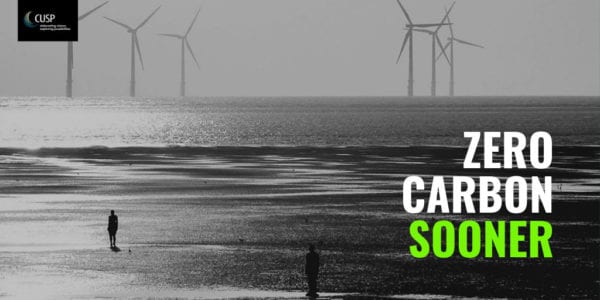The existential challenge of studying climate politics
Climate change is increasingly being discussed as an existential threat to human civilisation. How should this affect the work of political scientists who are investigating environmental politics? CUSP researcher Richard McNeill Douglas offers this suggestion: by following Charles Taylor’s arguments for engaged social science. (This blog first appeared on the PSA website.)

“So as long as I can keep talking about it then that helps with my mental health. But it’s not good. I mean, if I forget to take my sleeping pill I wake up with the horrors in the middle of the night and I can’t get back to sleep. And that’s just constant.”
These are the words of a scientist, working on the impacts of climate change, whom I’ve interviewed in my PhD research. Such reports are not uncommon. They’re suggestive of the existential angst which a daily reckoning with the science of climate change is liable to lead to. It is no surprise that ‘climate change burnout’, a state of exhaustion caused by prolonged anxiety about a bleak future one feels powerless to change, is a well-understood condition among environmental activists.
There is good reason to feel anxious. Even taking into account national targets to reduce greenhouse gas emissions, the world appears on track for a rise in average temperatures of around 3 degrees Celsius by the end of this century. At just 2 degree Celsius, some scientists have warned, there is the possibility that feedbacks set off by rising temperatures—such as the release of methane, a potent greenhouse gas, from the thawing Siberian permafrost—might set in train an unarrestable ‘Hothouse Earth’ scenario, in which the world becomes far less supportive of human life. In this context it’s unsurprising to find increasing discussion of climate change as a genuinely existential threat to human life itself.
At the same time a number of prominent scientists caution against using such doom-laden rhetoric on the grounds that, by suggesting that nothing can be done to alter this future, it encourages people to do nothing. In fact, even as the reports of the IPCC highlight the worsening effects of climate change, they still point to alternative pathways we can take to limit the damage. Lack of progress in tackling climate change is not down to a lack of understanding as to how to do so; there have been technocratic blueprints for decades. The issue has been that they have not been implemented—or where they have, not nearly at the scale or pace required.
What this highlights is that it is politics which holds the key to mitigating climate change. That progress in mitigating carbon emissions has been so slow signals that politics has been dysfunctional. A handful of years ago climate change was widely acknowledged as a high priority for state action. In the UK there was competition over which party could be viewed as the greenest, David Cameron seeking to ‘decontaminate the Conservative brand’ with the slogan ‘Vote Blue, Go Green’. In the wake of the 2008 financial crash, however, climate change plummeted in political salience. A few years later Cameron was reportedly urging his ministers to ‘get rid of all the green crap’. In the United States, in 2016 some 63 million Americans voted in Donald Trump as President, a man well-known for his view that ‘climate change [is] bullshit’. While in recent months the campaigning of Extinction Rebellion and words of teenage activist Greta Thunberg have helped to raise the prominence of climate change as a political priority, there remains a large gap between rhetoric and policy—as doubts expressed about Theresa May’s net-zero carbon emissions target for 2050 testify.
The challenge for political science
If politics holds the key to taking action on climate change, then political science also offers the following practical grounds for hope: if we can understand what is blocking a political agreement to implementing the measures required, then we may be able to identify the means to overcome it. In fact, if we were to follow the philosopher Hans Jonas—who argued that those who realise their society is unsustainable must heed the ‘imperative of responsibility’ for changing it—then we would make this our mission.
But if we take on such a political mission, how can we maintain an objective consideration of our research itself? Here we may learn a great deal from what has been termed the interpretive turn in social science, particularly the philosophical hermeneutics of Charles Taylor. Interpretive approaches are based on an acknowledgement of the impossibility of value-free research—but through this very acknowledgement aim to build an approach which is actually more robust. Of course, it is hard to be objective when analysing one’s research. ‘But,’ as Taylor says, ‘it helps, rather than hinders, the cause to be aware of this.’
What this approach offers is a method which is both engaged and understanding: it is precisely in acknowledging our own engaged nature that we can hope to understand other people. In this sense it offers a contrast with much of the political science on the resistance to climate policy and science to date (see Björnberg et al. for a good overview). While much of this work represents a thorough examination of the opposition to climate policy, something is perhaps lost in the way this phenomenon is regarded from the outside, with an implicit (but understandable) attitude of censure. In effect, this analysis functions as a form of pathology. This does not invalidate any of its findings: such ‘environmental scepticism’ is wrong about climate change. But it does raise questions about how much this phenomenon is truly understood.
Research I am carrying out for CUSP draws on the hermeneutical insight that a sense of meaning is ultimately what we pursue in life. Viewing the opposition to environmental policy through this perspective means approaching it as a feature of human self-understanding: not something done solely by them—those fossil fuel elites, or ‘cool dudes’ among the public—but also something done by us, in the sense in which this is a significant feature of the human response to our collective environmental predicament.
The arguments of environmental scepticism may seem more rational if understood as in part a defence of a vision of modernity (e.g., see my CUSP working paper) against the existential threat conveyed by environmental science. The importance of such analysis lies in suggesting that progress in politics depends on something beyond politics itself: that what we need is an environmental philosophy which offers a greater sense of meaningfulness in a world in which environmental limits are foreclosing on the prospect of endless material progress.



